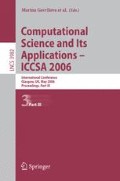Abstract
This paper proposes a simple pseudorandom number generator [PRNG] by using optimal normal basis. It is well known that the squaring and multiplication in finite field with optimal normal basis is very fast and the basis can be transformed to a canonical form. The suggested PRNG algorithm combines typical multiplications and exclusive-or bit operations, both operations can be easily implemented. It is shown that the algorithm passes all terms of the Diehard and the ENT tests for long sequences. This algorithm can be applied in various applications such as financial cryptography.
Access this chapter
Tax calculation will be finalised at checkout
Purchases are for personal use only
Preview
Unable to display preview. Download preview PDF.
References
Rukhin, A., Soto, J., Nechvatal, J., Smid, M., Barker, E., Leigh, S., Levenson, M., Vangel, M., Banks, D., Heckert, A., Dray, J., Vo, S.: A statistical test suite for random and pseudorandom number generators for cryptographic applications. NIST Special Publication 800-22 (2001), http://www.nist.gov/
Wu, P.: Random number generation with primitive pentanomials. ACT Trans. on Modeling and Computer Simulations 11(4), 346–351 (2001)
Carr, J.R.: Simple random number generation. Computers & Geosciences 29, 1269–1275 (2003)
Lee, L., Wong, K.: A random number generator based on elliptic curve operations. Computers and Mathematics with Applications 47, 217–226 (2004)
Mullin, R.C., Onyszchuk, I.M., Vanstone, S.A.: Optimal normal bases in GF(pn). Discrete Applied Mathematics 22, 146–161 (1988)
Sunar, B., Koc, C.K.: An efficient optimal normal basis type II multiplier. IEEE Trans. on Computers 50(1), 83–87 (2001)
Sunar, B., Koc, C.K.: An efficient optimal normal basis type II multiplier. IEEE Trans. on Computers 50(1), 83–87 (2001)
Walker, J.: ENT, A pseudorandom number sequence test program (1998), http://www.fourmilab.ch/random/
Ritter, T.: The efficient generation of cryptographic confusion sequences. Cryptologia 12(5), 81–139 (1991)
Marsaglia, G., Tsang, W.W.: The 64-bit universal RNG. Statistics & Probability Letters 66, 183–187 (2004)
Marsaglia, G.: Diehard battery of tests of randomness (1995), http://www.stat.fsu.edu/pub/diehard/
Ryabko, B.Y., Stognienko, V.S., Shokin, Y.I.: A new test for randomness and its application to some cryptographic problems. Journal of Statistical Planning and Inference 123, 365–376 (2004)
Author information
Authors and Affiliations
Editor information
Editors and Affiliations
Rights and permissions
Copyright information
© 2006 Springer-Verlag Berlin Heidelberg
About this paper
Cite this paper
Jang, I., Yoo, H.S. (2006). Pseudorandom Number Generator Using Optimal Normal Basis. In: Gavrilova, M., et al. Computational Science and Its Applications - ICCSA 2006. ICCSA 2006. Lecture Notes in Computer Science, vol 3982. Springer, Berlin, Heidelberg. https://doi.org/10.1007/11751595_23
Download citation
DOI: https://doi.org/10.1007/11751595_23
Publisher Name: Springer, Berlin, Heidelberg
Print ISBN: 978-3-540-34075-1
Online ISBN: 978-3-540-34076-8
eBook Packages: Computer ScienceComputer Science (R0)

